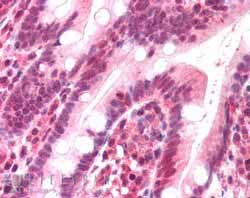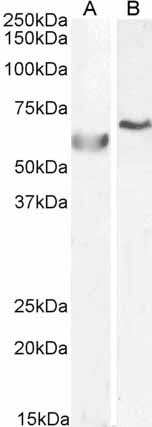Goat Anti-POLL / POLkappa Antibody
Peptide-affinity purified goat antibody
- SPECIFICATION
- CITATIONS
- PROTOCOLS
- BACKGROUND

Application
| WB, E |
|---|---|
| Primary Accession | Q9UGP5 |
| Other Accession | NP_037406, 27343, 56626 (mouse) |
| Reactivity | Human |
| Predicted | Mouse |
| Host | Goat |
| Clonality | Polyclonal |
| Concentration | 100ug/200ul |
| Isotype | IgG |
| Calculated MW | 63482 Da |
| Gene ID | 27343 |
|---|---|
| Other Names | DNA polymerase lambda, Pol Lambda, 2.7.7.7, 4.2.99.-, DNA polymerase beta-2, Pol beta2, DNA polymerase kappa, POLL |
| Format | 0.5 mg IgG/ml in Tris saline (20mM Tris pH7.3, 150mM NaCl), 0.02% sodium azide, with 0.5% bovine serum albumin |
| Storage | Maintain refrigerated at 2-8°C for up to 6 months. For long term storage store at -20°C in small aliquots to prevent freeze-thaw cycles. |
| Precautions | Goat Anti-POLL / POLkappa Antibody is for research use only and not for use in diagnostic or therapeutic procedures. |
| Name | POLL (HGNC:9184) |
|---|---|
| Function | DNA polymerase that functions in several pathways of DNA repair (PubMed:11457865, PubMed:19806195, PubMed:20693240, PubMed:30250067). Involved in base excision repair (BER) responsible for repair of lesions that give rise to abasic (AP) sites in DNA (PubMed:11457865, PubMed:19806195). Also contributes to DNA double- strand break repair by non-homologous end joining and homologous recombination (PubMed:19806195, PubMed:20693240, PubMed:30250067). Has both template-dependent and template-independent (terminal transferase) DNA polymerase activities (PubMed:10887191, PubMed:10982892, PubMed:12809503, PubMed:14627824, PubMed:15537631, PubMed:19806195). Also has a 5'-deoxyribose-5-phosphate lyase (dRP lyase) activity (PubMed:11457865, PubMed:19806195). |
| Cellular Location | Nucleus. Chromosome. Note=Accumulates at sites of DNA damage |
| Tissue Location | Expressed in a number of tissues. Abundant in testis. |

Thousands of laboratories across the world have published research that depended on the performance of antibodies from Abcepta to advance their research. Check out links to articles that cite our products in major peer-reviewed journals, organized by research category.
info@abcepta.com, and receive a free "I Love Antibodies" mug.
Provided below are standard protocols that you may find useful for product applications.
Background
This gene encodes a DNA polymerase. DNA polymerases catalyze DNA-template-directed extension of the 3'-end of a DNA strand. This particular polymerase, which is a member of the X family of DNA polymerases, likely plays a role in non-homologous end joining and other DNA repair processes. Alternatively spliced transcript variants have been described.
References
DNA polymerases beta and lambda bypass thymine glycol in gapped DNA structures. Belousova EA, et al. Biochemistry, 2010 Jun 8. PMID 20423048.
Interaction between DNA Polymerase lambda and anticancer nucleoside analogs. Garcia-Diaz M, et al. J Biol Chem, 2010 May 28. PMID 20348107.
A novel mechanism of sugar selection utilized by a human X-family DNA polymerase. Brown JA, et al. J Mol Biol, 2010 Jan 15. PMID 19900463.
An 8-oxo-guanine repair pathway coordinated by MUTYH glycosylase and DNA polymerase lambda. van Loon B, et al. Proc Natl Acad Sci U S A, 2009 Oct 27. PMID 19820168.
Characterization of a natural mutator variant of human DNA polymerase lambda which promotes chromosomal instability by compromising NHEJ. Terrados G, et al. PLoS One, 2009 Oct 6. PMID 19806195.
If you have used an Abcepta product and would like to share how it has performed, please click on the "Submit Review" button and provide the requested information. Our staff will examine and post your review and contact you if needed.
If you have any additional inquiries please email technical services at tech@abcepta.com.













 Foundational characteristics of cancer include proliferation, angiogenesis, migration, evasion of apoptosis, and cellular immortality. Find key markers for these cellular processes and antibodies to detect them.
Foundational characteristics of cancer include proliferation, angiogenesis, migration, evasion of apoptosis, and cellular immortality. Find key markers for these cellular processes and antibodies to detect them. The SUMOplot™ Analysis Program predicts and scores sumoylation sites in your protein. SUMOylation is a post-translational modification involved in various cellular processes, such as nuclear-cytosolic transport, transcriptional regulation, apoptosis, protein stability, response to stress, and progression through the cell cycle.
The SUMOplot™ Analysis Program predicts and scores sumoylation sites in your protein. SUMOylation is a post-translational modification involved in various cellular processes, such as nuclear-cytosolic transport, transcriptional regulation, apoptosis, protein stability, response to stress, and progression through the cell cycle. The Autophagy Receptor Motif Plotter predicts and scores autophagy receptor binding sites in your protein. Identifying proteins connected to this pathway is critical to understanding the role of autophagy in physiological as well as pathological processes such as development, differentiation, neurodegenerative diseases, stress, infection, and cancer.
The Autophagy Receptor Motif Plotter predicts and scores autophagy receptor binding sites in your protein. Identifying proteins connected to this pathway is critical to understanding the role of autophagy in physiological as well as pathological processes such as development, differentiation, neurodegenerative diseases, stress, infection, and cancer.



